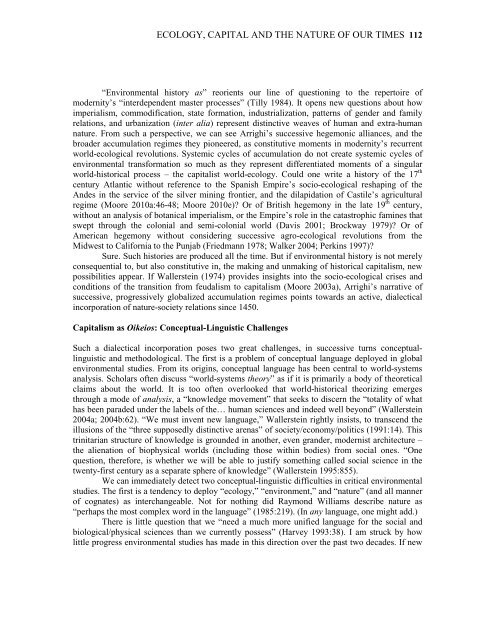Entire Volume 17 issue 1 - Journal of World-Systems Research ...
Entire Volume 17 issue 1 - Journal of World-Systems Research ...
Entire Volume 17 issue 1 - Journal of World-Systems Research ...
Create successful ePaper yourself
Turn your PDF publications into a flip-book with our unique Google optimized e-Paper software.
ECOLOGY, CAPITAL AND THE NATURE OF OUR TIMES 112<br />
“Environmental history as” reorients our line <strong>of</strong> questioning to the repertoire <strong>of</strong><br />
modernity’s “interdependent master processes” (Tilly 1984). It opens new questions about how<br />
imperialism, commodification, state formation, industrialization, patterns <strong>of</strong> gender and family<br />
relations, and urbanization (inter alia) represent distinctive weaves <strong>of</strong> human and extra-human<br />
nature. From such a perspective, we can see Arrighi’s successive hegemonic alliances, and the<br />
broader accumulation regimes they pioneered, as constitutive moments in modernity’s recurrent<br />
world-ecological revolutions. Systemic cycles <strong>of</strong> accumulation do not create systemic cycles <strong>of</strong><br />
environmental transformation so much as they represent differentiated moments <strong>of</strong> a singular<br />
world-historical process – the capitalist world-ecology. Could one write a history <strong>of</strong> the <strong>17</strong> th<br />
century Atlantic without reference to the Spanish Empire’s socio-ecological reshaping <strong>of</strong> the<br />
Andes in the service <strong>of</strong> the silver mining frontier, and the dilapidation <strong>of</strong> Castile’s agricultural<br />
regime (Moore 2010a:46-48; Moore 2010e)? Or <strong>of</strong> British hegemony in the late 19 th century,<br />
without an analysis <strong>of</strong> botanical imperialism, or the Empire’s role in the catastrophic famines that<br />
swept through the colonial and semi-colonial world (Davis 2001; Brockway 1979)? Or <strong>of</strong><br />
American hegemony without considering successive agro-ecological revolutions from the<br />
Midwest to California to the Punjab (Friedmann 1978; Walker 2004; Perkins 1997)?<br />
Sure. Such histories are produced all the time. But if environmental history is not merely<br />
consequential to, but also constitutive in, the making and unmaking <strong>of</strong> historical capitalism, new<br />
possibilities appear. If Wallerstein (1974) provides insights into the socio-ecological crises and<br />
conditions <strong>of</strong> the transition from feudalism to capitalism (Moore 2003a), Arrighi’s narrative <strong>of</strong><br />
successive, progressively globalized accumulation regimes points towards an active, dialectical<br />
incorporation <strong>of</strong> nature-society relations since 1450.<br />
Capitalism as Oikeios: Conceptual-Linguistic Challenges<br />
Such a dialectical incorporation poses two great challenges, in successive turns conceptuallinguistic<br />
and methodological. The first is a problem <strong>of</strong> conceptual language deployed in global<br />
environmental studies. From its origins, conceptual language has been central to world-systems<br />
analysis. Scholars <strong>of</strong>ten discuss “world-systems theory” as if it is primarily a body <strong>of</strong> theoretical<br />
claims about the world. It is too <strong>of</strong>ten overlooked that world-historical theorizing emerges<br />
through a mode <strong>of</strong> analysis, a “knowledge movement” that seeks to discern the “totality <strong>of</strong> what<br />
has been paraded under the labels <strong>of</strong> the… human sciences and indeed well beyond” (Wallerstein<br />
2004a; 2004b:62). “We must invent new language,” Wallerstein rightly insists, to transcend the<br />
illusions <strong>of</strong> the “three supposedly distinctive arenas” <strong>of</strong> society/economy/politics (1991:14). This<br />
trinitarian structure <strong>of</strong> knowledge is grounded in another, even grander, modernist architecture –<br />
the alienation <strong>of</strong> biophysical worlds (including those within bodies) from social ones. “One<br />
question, therefore, is whether we will be able to justify something called social science in the<br />
twenty-first century as a separate sphere <strong>of</strong> knowledge” (Wallerstein 1995:855).<br />
We can immediately detect two conceptual-linguistic difficulties in critical environmental<br />
studies. The first is a tendency to deploy “ecology,” “environment,” and “nature” (and all manner<br />
<strong>of</strong> cognates) as interchangeable. Not for nothing did Raymond Williams describe nature as<br />
“perhaps the most complex word in the language” (1985:219). (In any language, one might add.)<br />
There is little question that we “need a much more unified language for the social and<br />
biological/physical sciences than we currently possess” (Harvey 1993:38). I am struck by how<br />
little progress environmental studies has made in this direction over the past two decades. If new





